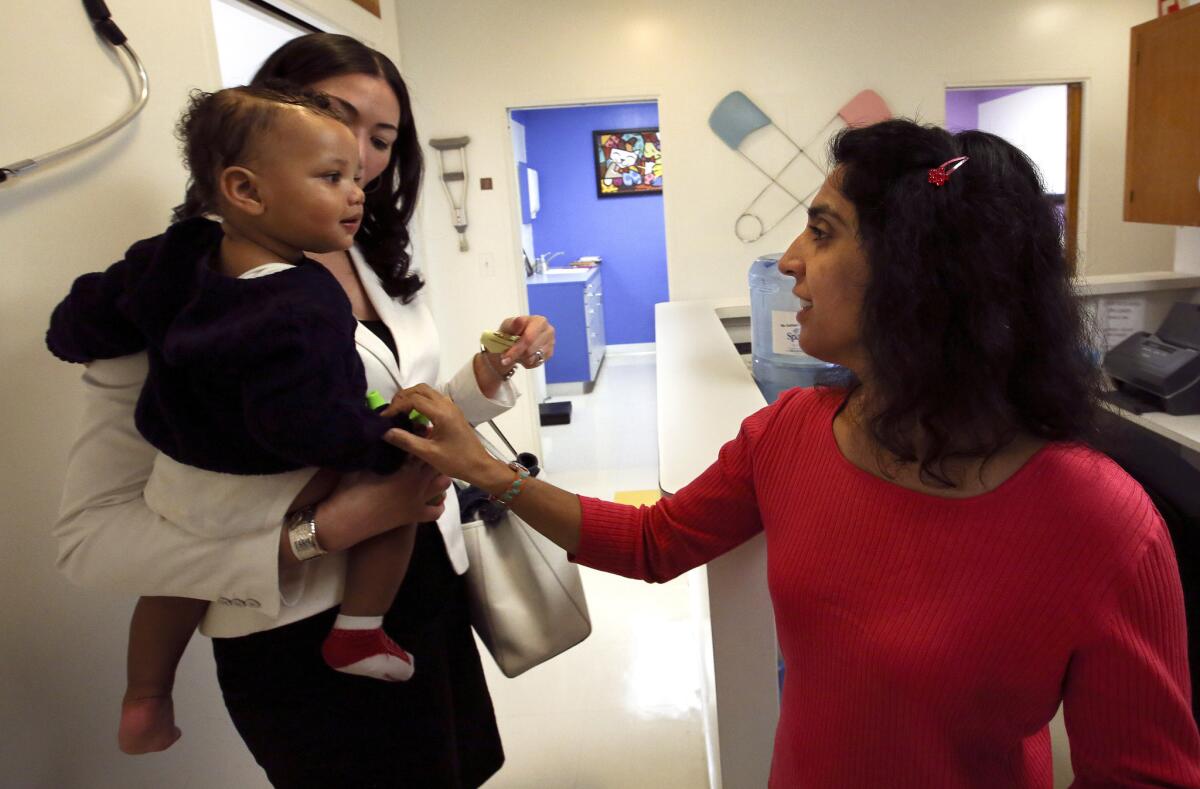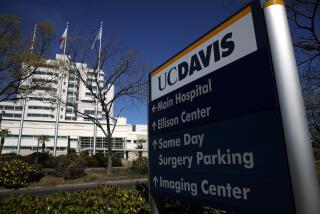Q&A: What would the proposed California vaccine law do?

Dr. Monica Asnani, right, says goodbye to Kristian Richard, 1, being held by his mother Natasha, after the child was given a measles-mumps-rubella vaccine at the Medical Arts Pediatric Med Group on Wilshire Boulevard in Los Angeles.
The California Assembly has passed a bill that would create one of the toughest mandatory vaccination laws in the nation and would require more children to be vaccinated as a condition of school enrollment.
The state Senate passed a version of the bill in May on a 25-11 vote, and now needs to consider minor amendments approved by the Assembly. If the Senate approves the Assembly’s version of the bill, it then heads to the governor’s desk for a signature.
What would the legislation, SB 277, do if Gov. Jerry Brown signs it?
It would end parents’ ability to decline vaccinations for children when they are enrolled in public and private schools and day care centers. Parents would no longer be able to cite personal beliefs in rejecting vaccinations.
What about children who have a medical reason to avoid vaccinations, such as an allergy or leukemia?
Such children would still be exempt from vaccinations. The proposed law would state that a doctor’s note would need to specify why the child cannot get vaccinated.
What happens to children whose parents decline vaccinations?
They will have to be enrolled in a home-based private school, or in an independent study program not based in the classroom.
What about children who have vaccine exemptions on file?
They will be able to continue with day care until they enroll in kindergarten, or in elementary school until they enroll in the 7th grade. Then, parents will have to decide whether to vaccinate or take their children out of school.
How many children have a form on file declining one or more vaccines due to a parent’s beliefs?
In the fall of 2014, there were 13,592 kindergartners with personal belief exemptions on file. That made up 2.54% of the state’s kindergartners.
In the fall of 1998, there were 4,032 kindergartners with personal belief exemptions on file. That made up 0.77% of the state’s kindergartners.
What is existing law?
State law already requires schoolchildren and day care enrollees to be vaccinated for a number of diseases. But parents were able to reject the vaccinations if they said vaccines contradicted their personal beliefs. Parents would need to file a form that they were counseled by a healthcare practitioner on the risks of children not getting immunized.
Why was the proposal introduced?
A measles outbreak that began in Disneyland during the winter holidays spiraled into the worst that California has seen since the 1988-91 national measles outbreak. From December through April, there were 136 measles cases in California residents, and about one in five of them was hospitalized.
Measles immunization rates for kindergartners in California have been dropping from 2002, when the rate was 95.7%. By 2013, it had dropped down to 92.2%. Experts say measles immunization rates need to stay above 95% to keep the community safe from outbreaks.
What areas of California have lower measles vaccination rates than others?
A Los Angeles Times analysis in February found that preschools in affluent areas such as the Westside, the South Bay and southern Orange County tended to have lower measles vaccination rates than others.
Other preschools that reported lower measles vaccination rates as of last October included Beverly Hills, Hollywood, Silver Lake, the western and southern San Fernando Valley and Pasadena.
Elsewhere in the state, Marin County, Berkeley, the U.S. 101 corridor in Silicon Valley, coastal neighborhoods in San Diego County, the Eureka area and Sacramento’s northeastern suburbs also had clusters of childcare centers with low measles vaccination rates.
Follow me on Twitter for more California breaking news: @ronlin
More to Read
Sign up for Essential California
The most important California stories and recommendations in your inbox every morning.
You may occasionally receive promotional content from the Los Angeles Times.











